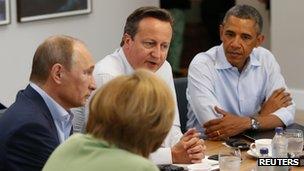What will G8 do about Syria and taxes?
- Published
- comments

The G8 is likely to reach agreement on Syria today, Downing Street believes, although the exact wording of any statement is still the subject of tense negotiations.
The issue which is causing most difficulties is what the G8 should say about the transition to a new Syrian government after any new round of peace negotiations.
President Putin has already signed up to the idea of what are known as the Geneva Two talks but is thought to be resisting wording which suggests that it is inevitable that Syria's President Assad will be replaced.
While the G8 leaders focus on tax this morning, their "sherpas" - summit jargon for officials - are hammering out possible wording of a statement on Syria. The areas on which the G8 seems likely to agree are :
Increased humanitarian aid and international agreement to facilitate access for organisations like the Red Cross
Combating jihadists within the Syrian rebel movement
Opposition to the use of chemical weapons (albeit that Russia does not accept that there is clear evidence that the regime has used them)
On the issue of tax transparency, Downing Street predicts that, while there will be agreement to produce registers of who really owns companies (so-called "beneficial ownership"), not all G8 countries will agree to publish such information - a key demand of aid organisations.
Chancellor George Osborne told BBC Radio 4 this morning that the UK government was consulting on whether to do this anyway. He claimed that more progress had been made in the past 24 hours than in the past 24 years.
Although many tax campaigners will complain that the expected G8 deal does not go far enough, most concede that the discussions here mark a turning point in the campaign to expose tax criminality and to pressurise global corporations to pay more tax in the countries where they make their profits.